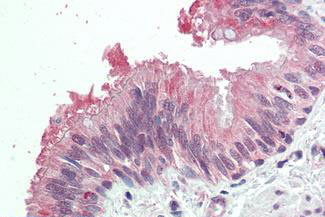MDFI / I-MF Antibody (Internal)
Goat Polyclonal Antibody
- SPECIFICATION
- CITATIONS
- PROTOCOLS
- BACKGROUND

Application
| IHC-P, E |
|---|---|
| Primary Accession | Q99750 |
| Other Accession | 4188 |
| Reactivity | Human |
| Host | Goat |
| Clonality | Polyclonal |
| Calculated MW | 25029 Da |
| Dilution | ELISA (1:16000), IHC-P (5 µg/ml), |
| Gene ID | 4188 |
|---|---|
| Other Names | MDFI, I-MF, I-mfa, MyoD family inhibitor, Inhibitor of MyoD family a, Myogenic repressor I-mf |
| Target/Specificity | Human MDFI. |
| Reconstitution & Storage | Tris-buffered saline, pH 7.3, 0.5% BSA, 0.02% sodium azide. Store at -20°C. Minimize freezing and thawing. |
| Precautions | MDFI / I-MF Antibody (Internal) is for research use only and not for use in diagnostic or therapeutic procedures. |
| Name | MDFI |
|---|---|
| Function | Inhibits the transactivation activity of the Myod family of myogenic factors and represses myogenesis. Acts by associating with Myod family members and retaining them in the cytoplasm by masking their nuclear localization signals. Can also interfere with the DNA- binding activity of Myod family members. Plays an important role in trophoblast and chondrogenic differentiation. Regulates the transcriptional activity of TCF7L1/TCF3 by interacting directly with TCF7L1/TCF3 and preventing it from binding DNA. Binds to the axin complex, resulting in an increase in the level of free beta-catenin. Affects axin regulation of the WNT and JNK signaling pathways (By similarity). |
| Cellular Location | Nucleus. Cytoplasm. |

Thousands of laboratories across the world have published research that depended on the performance of antibodies from Abcepta to advance their research. Check out links to articles that cite our products in major peer-reviewed journals, organized by research category.
info@abcepta.com, and receive a free "I Love Antibodies" mug.
Provided below are standard protocols that you may find useful for product applications.
Background
Inhibits the transactivation activity of the Myod family of myogenic factors and represses myogenesis. Acts by associating with Myod family members and retaining them in the cytoplasm by masking their nuclear localization signals. Can also interfere with the DNA-binding activity of Myod family members. Plays an important role in trophoblast and chondrogenic differentiation. Regulates the transcriptional activity of TCF7L1/TCF3 by interacting directly with TCF7L1/TCF3 and preventing it from binding DNA. Binds to the axin complex, resulting in an increase in the level of free beta-catenin. Affects axin regulation of the WNT and JNK signaling pathways (By similarity).
References
Kraut N.,et al.Mamm. Genome 8:618-619(1997).
Mungall A.J.,et al.Nature 425:805-811(2003).
If you have used an Abcepta product and would like to share how it has performed, please click on the "Submit Review" button and provide the requested information. Our staff will examine and post your review and contact you if needed.
If you have any additional inquiries please email technical services at tech@abcepta.com.













 Foundational characteristics of cancer include proliferation, angiogenesis, migration, evasion of apoptosis, and cellular immortality. Find key markers for these cellular processes and antibodies to detect them.
Foundational characteristics of cancer include proliferation, angiogenesis, migration, evasion of apoptosis, and cellular immortality. Find key markers for these cellular processes and antibodies to detect them. The SUMOplot™ Analysis Program predicts and scores sumoylation sites in your protein. SUMOylation is a post-translational modification involved in various cellular processes, such as nuclear-cytosolic transport, transcriptional regulation, apoptosis, protein stability, response to stress, and progression through the cell cycle.
The SUMOplot™ Analysis Program predicts and scores sumoylation sites in your protein. SUMOylation is a post-translational modification involved in various cellular processes, such as nuclear-cytosolic transport, transcriptional regulation, apoptosis, protein stability, response to stress, and progression through the cell cycle. The Autophagy Receptor Motif Plotter predicts and scores autophagy receptor binding sites in your protein. Identifying proteins connected to this pathway is critical to understanding the role of autophagy in physiological as well as pathological processes such as development, differentiation, neurodegenerative diseases, stress, infection, and cancer.
The Autophagy Receptor Motif Plotter predicts and scores autophagy receptor binding sites in your protein. Identifying proteins connected to this pathway is critical to understanding the role of autophagy in physiological as well as pathological processes such as development, differentiation, neurodegenerative diseases, stress, infection, and cancer.


